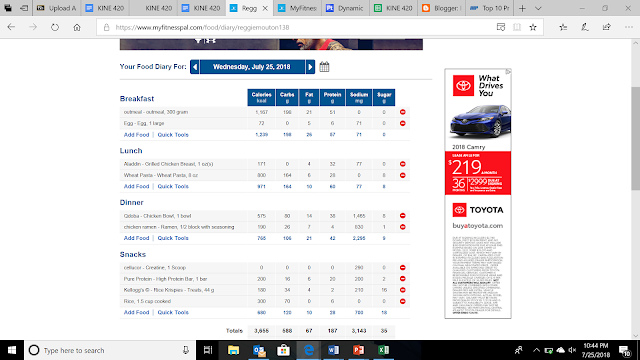Sample Meal Plan for Powerlifters
Nutritional Needs:
Energy Requirements:
Powerlifting is a competition that is at a very high intensity but only for a short duration. This means that during competitions, Powerlifters use the Creatine Phosphate system. As for training, Powerlifters tend to use the Creatine Phosphate and Anaerobic Glycolysis depending on their cycle and what kind of resistance training their doing (i.e. strength phase, hypertrophy, etc.)
Amount of Nutrients:
Assuming the Powerlifter is reaching a peak in his cycle (undulating periodization) I would recommend having them consume 45 kcal/kg (upper amount recommended) per day. This would insure that they are receiving an adequate amount of nutrients. More specifically, I would tell my athlete to consume a total amount of 7 g/kg CHO per day, 2 g/kg PRO per day, and 1 g/kg Fat per day. In other words, if my athlete was 185lbs (~84 kg), I would recommend them to make sure and get 588g of CHO, 168g of PRO, and 84g of Fats. As for hydration I would recommend consuming 42 mL/kg (3.528 L).
Timing:
Prior to exercise it is important for athletes to consumes 1 g/kg of CHO per hour before training. That being said, I would have to make sure my Powerlifter consumed 84 g of CHO an hour before resistance training. As for Hydration, it is important for the athlete to consume 3-5 mL/kg at least 2 hour prior to resistance training (5-7mL/kg if 4+ hours before).
During the exercise, I would say to consume anywhere from 30-50 g/hr CHO of resistance training because I know their program would last anywhere from an hour to an hour and a half. The only thing is I would have to see how much my athlete sweats during the workout in order to properly tell him how much fluid he should consume during the exercise.
After the exercise, I would ensure that my athlete consumed 1.5 g/kg of CHO within the first hour of finishing their workout. Also, it is important that the Powerlifter consumed 25 g of protein right after working out. Finally, in order to make sure the athlete rehydrated, I would tell them to drink 1.5 L/ kg lost during the exercise.
Supplements:
Work Cited:
- Marie Dunford & J. Andrew Doyle, Nutrition for Sport and Exercise (4th ed.): Cengage Learning
- R., D., J., T., R., R., . . . H. (2017, June 13). International Society of Sports Nutrition position stand: Safety and efficacy of creatine supplementation in exercise, sport, and medicine. Retrieved from https://jissn.biomedcentral.com/articles/10.1186/s12970-017-0173-z
- Wilson, J. M., Fitschen, P. J., Campbell, B., Wilson, G. J., Zanchi, N., Taylor, L., ... & Ziegenfuss, T. N. (2013). International Society of Sports Nutrition position stand: beta-hydroxy-beta-methylbutyrate (HMB). Journal of the International Society of Sports Nutrition, 10(1), 6.
- E., A., J., J., C., C., . . . J. (2015, July 15). International society of sports nutrition position stand: Beta-Alanine. Retrieved from https://jissn.biomedcentral.com/articles/10.1186/s12970-015-0090-y

Very nice post! I really like that they use the macronutrient diet and that there's no need to count calories.
ReplyDeleteHey,
ReplyDeleteI had no idea the nutritional needs for a power lifter were like that, and so intense! Creatine supplements seem to be very important, as creatine is usually the first source of energy when weightlifting to get depleted, so having it replenished after every workout and supplemented throughout the day seem as though it would be very useful.
Hi Reggie,
ReplyDeleteI liked how well rounded your meal plan was and how you emphasized how individualized it will be for every athlete terms of carbs, protein, fats, as well as water intake and supplements. It was interesting reading up on how powerlifters ideally want to be light as possible, yet still need to be in a hypertrophic state. I had no idea their diets needed to be this precised and timed accordingly! This information would be useful for those powerlifters to reduce fatigue while hitting their goals.
I really liked this read, and appreciate you giving examples of what the macronutrients would be for a specific individual. Your advice on what to do for the nutritional aspect of plateauing was also particularly helpful, as I did not even consider to change up the diet when plateauing. For the supplements, I have taken creatine myself and loved it, but now that you mention beta-alanine, I do not know why I haven't considered it in the past. Great read!
ReplyDelete